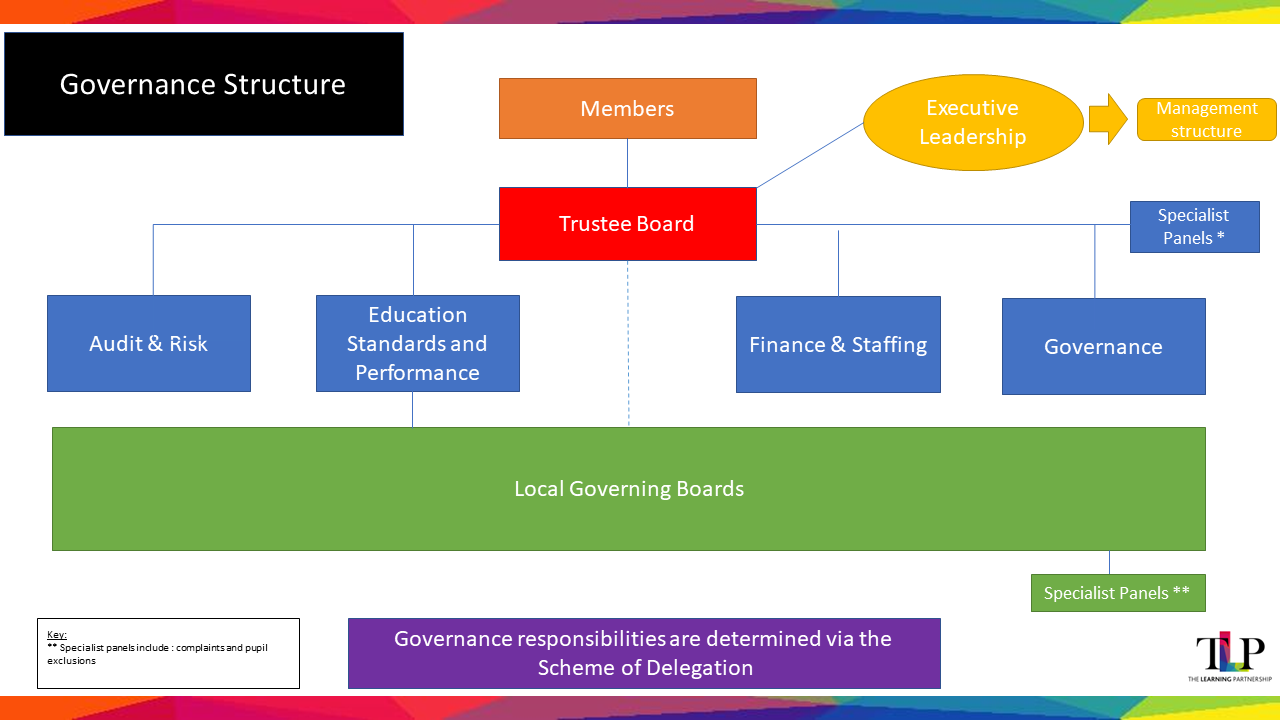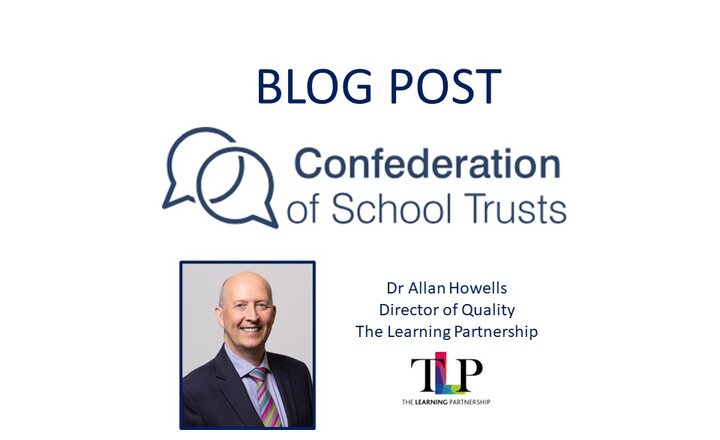Welcome to the governance pages of The Learning Partnership. Here you will find information about how the Trust operates its governance arrangements.
What is governance?
The National Governance Association uses the following explanation, taken from the Institute on Governance, Canada.
“Governance of an organisation determines…..who has the power, who makes the decisions, how other players make their voice heard, and how account is rendered.”
Good and effective governance is at the heart of delivering educational excellence. A clearly defined structure, where all parties understand their roles and responsibilities, is essential to provide the best education for our pupils.
The Trust has made a commitment to maintain a clear distinction between accountability through governance (i.e. by the Trust Board and its committees) and accountability through line-management (i.e. by executive leaders). The Trust has a scheme of delegation which reflects this distinction and clarifies roles and responsibilities:
How does the Trust’s governance work?
The Trust operates a layered structure of governance. The model adopted is familiar across the education sector and features four distinct layers of governance, namely:
a. Members
b. Trustees
c. Committees
d. Designated individuals (The Executive Team)
Please see below for a schematic that summarises our governance structure:

What does each layer of the governance framework do?
Members of the Trust are guardians of the governance of the Trust. The role of the Member is analogous to that of the non-voting shareholders in a company. Members may amend the Articles of Association, appoint and remove Trustees, appoint external auditors, and give direction by special resolution to the Board. Members receive information about the Trust’s business and receive the annual report and accounts. However, the actual engagement of Members with the Trust on a day-to-day basis is very minimal.
Trustees are unpaid volunteers who are responsible for the oversight of the general control and management of the administration of the Trust. This is done in accordance with the provisions set out in the Memorandum and Articles of Association and its funding agreement with the Department of Education. Trustees’ engagement is ongoing and interactive, mainly with the executive leaders of the Trust, although not necessarily on a day-to-day basis.
The Trust Board is legally responsible and accountable for all statutory functions and for the performance of all schools within the Trust:
Trust Board Terms of Reference
It approves the written scheme of delegation, including that for financial powers, that maintains robust internal control arrangements. It maintains oversight through regular meetings and through its scheme of delegation using committees as appropriate.
The Board of Trustees appoint the Chief Executive (CEO), to whom it delegates responsibility for the conduct and day-to-day performance of the Trust, including the performance of the schools and financial management of the Trust. The Trust has determined that the CEO will not be a Trustee.
The Board of Trustees may establish Committees of the Board at any time. These, which include the Local Governing Boards (LGBs), support the delivery and oversight of elements of the Trust vision and strategy. Each Committee will have specific terms of reference agreed by the Board.
The Committees established currently are:
Audit and Risk Committee
Education, Standards and Performance Committee
Finance and Staffing Committee
Governance Committee
The terms of reference for these Committees are agreed by the Trust Board.
How is governance undertaken at the school level?
The Board of Trustees has established Local Governing Boards (LGBs) to carry out aspects of school-level governance functions. At a high level this can be thought of as having a focus on:
a. Curriculum
b. Behaviour and attendance
c. Pupil and staff wellbeing (safeguarding, SEND provision, etc)
d. Community links and relationships
The terms of reference and other documents below provide for more formal information about the role of the Local Governing Board and the role of LGB Governor.
Role of the LBG and Responsibility of Governors
Local Governing Boards Terms of Reference
We operate the same model of governance across all the schools in the Trust. Click on the link below to access the names of governors, their declarations of interests, and the minutes of recently held meetings for all schools in our Trust:
All schools' Local Governing Boards
What do school governors do, and can I become one?
School governors are unpaid volunteers and form part of the largest volunteer workforce across the UK. They play an important part in the Trust’s governance framework. Each school has its own a local governing board comprising of up to nine governors. Individual governors are appointed by the Trust Board.
One important characteristic for all our Local Governing Boards is the desire to attract a membership that is drawn from a diverse group of individuals, nearly all of whom are local to the school. Our Trust values people with different skills, experiences and backgrounds to become governors. We don’t expect our governors to have previously worked in the education, although we do expect a commitment to engage positively and operate with integrity.
We recognise that as volunteer it is important that we also offer you something back too. As a new governor we provide induction and ongoing and continuous training for the role. We believe that for many, the experience of being a governor provides an opportunity to develop new skills that are transferable into their professional and personal lives.
See the document below for more information about the role of a school governor:
Governor Recruitment FAQs
or you can email our governance team at governorsclerk@tlptrust.com
Governance support
The Trust has a dedicated Governance Team which supports the governance functions across all layers of the Trust. Their role is both functional and advisory. They support all volunteers involved in governance, at each level, and can often be a source of both formal and informal advice and guidance to all involved.
For more information, please contact governorsclerk@tlptrust.com
Related News
